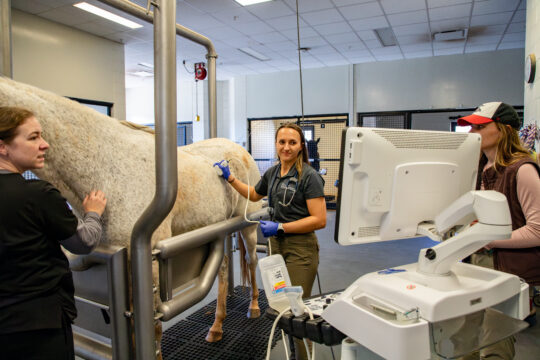Lemons aspires to the dual role of large animal care provider and researcher in the field of equine medicine. Her love for horses began in middle school – a little late by most standards, she says – but what she lacked for in timing she made up for with skill and enthusiasm.

Riding competitively through high school and her undergraduate studies in Biological Sciences at UGA, Lemons was a member of the UGA Equestrian team. Since her home state of Utah does not have its own vet school, Lemons applied to various colleges and interviewed in person at 13 schools before the Covid lockdown.
“During Covid I realized how good a community I had here,” she says. She ultimately chose UGA CVM for her graduate work. She applied and was accepted to CVM’s Veterinary Medical Scientist Training Program to earn dual DVM/Ph.D. degrees.
“Large animal internal medicine is my dream job,” she says, “and hopefully back in academia because I love teaching, the research and the clinical aspect as well.”
She got her first intro to UGA research as a sophomore in the theriogenology lab of Dr. Roberto Palomares. Wearing her equine team shirt to the labs one day led to an introduction to Hart, whose lab looks at endocrine, immunology interactions between horses and their foals.
Her Ph.D. thesis began to take shape the summer before vet school when Lemons reached out to a pediatric hematologist/oncologist, Dr. Josh Schiffman at the University of Utah, who translates animal studies of immunology into human medicine.
Specifically, Lemons is interested in equine neonatal sepsis. “Foals get really sick when they’re born and become septic and it’s a big problem that we still don’t fully understand to this day,” she says. “I translated a lot of (Schiffman’s) work into the horses and foals here, so my project is on neutrophil disfunction and equine neonatal sepsis and specially looking at neutrophil extracellular traps.”

Meg Lemons performs ultrasound on a horse at the VTH. Being an internist is like being a detective, she says, finding clues about the health of an animal’s GI tract, respiratory and cardiovascular system — everything inside — through behavior and history reported by the owners. (Lawton Harris/UGA CVM)
In the letter she wrote to the American Association of Equine Practitioners recommending Lemons for the Coyote Rock Ranch Scholarship, Hart says the work Lemons has done thus far will have far-reaching benefits for both veterinary and human medicine. “While Meg’s ultimate goal is to use her research and clinical training to save the lives of critically ill horses and foals, her research has already shown key similarities between equine and human NETosis and reinforces the importance of large mammalian models for bridging translational gaps between in vitro and rodent studies and clinical medicine.”
As has been her habit throughout her academic career, Lemons has found a way to marry her interests in a way that will benefit not only herself but the patients she serves.
“I’m in a unique position now where I still do research but I’m also in the clinical side of things, so in the hospital helping with cases,” Lemons says. “You see all these sick patients and you get really connected to them and you want to figure out what you can do to help and unfortunately there’s a lot of things in medicine we don’t know so kind of witnessing that frustration firsthand and being able to figure out a way in research to make a difference … is what keeps me motivated.”



